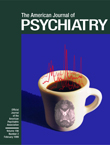Dr. West Replies
To the Editor: Dr. Wiseman comments that we may have failed to find an increase in anxiety following cessation of smoking because we looked at it after 24 hours and then again after 1 week. It is conceivable that anxiety as a symptom of withdrawal from smoking peaks on the second or third day and then decreases and that our measure after 24 hours was too early and our measure after 7 days was too late, but I think this is highly unlikely. No other DSM-IV nicotine withdrawal symptoms failed to be picked up by our methods, and I know of no other studies that have shown anxiety to peak specifically on day 2, 3, or 4. In addition, it is worth remembering that the ratings that smokers made after 1 week were in relation to the time since the last session and should have included all the days intervening.
Dr. Wiseman also suggests that our subjects may have for some reason smoked primarily for stimulation and that another group of subjects who smoked primarily for sedation might have experienced increased anxiety on stopping smoking. In fact, the distinction between stimulant and sedative smokers is artificial in that there is now good evidence that there is a positive correlation between smoking for stimulation and for sedation, rather than these being features of different categories of smokers. Also, it is highly implausible that by chance our heavy smokers happened to be those who smoked primarily for stimulation rather than sedation.



